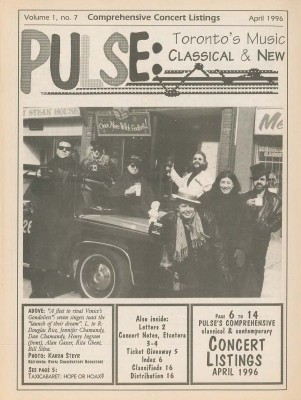 Blame WholeNote colleague M.J. Buell and this month’s edition of We Are All Music’s Children (p. 68) for sending me skittering down memory lane here, rather than sticking to the present. It’s occasionally an excellent adventure to go dipping back into our archive, as Buell’s column admirably illustrates.
Blame WholeNote colleague M.J. Buell and this month’s edition of We Are All Music’s Children (p. 68) for sending me skittering down memory lane here, rather than sticking to the present. It’s occasionally an excellent adventure to go dipping back into our archive, as Buell’s column admirably illustrates.
In my case I went scooting back through the online archive all the way to our very first April issue, hoping for some words of 24-year-old editorial wisdom I could riff on this time round. Only to find that the issue in question had no editorial it, the Publisher’s Podium in question being taken up instead by two aggrieved letters to the editor: one by recording engineer Frank Lockwood; the other by the late Richard Truhlar (known to many for his work for the Canadian Music Centre’s Centrediscs). Both letters scolded a third reader (a certain Mr. Thomas Varese) for daring to suggest, in a previous letter, that “the performing of contemporary Canadian classical music is almost non-existent in Toronto compared to Montreal.” Truhlar pointed out that in fact he had “counted 28 concert performances in the March 1996 listings of Pulse [as WholeNote in its infancy was called] that included 20th century and contemporary Canadian music.”
So, no joy there, but instead an unexpected little ripple of pleasure at the issue in question’s cover story, titled “TaxiCabaret: Hope or Hoax?” – one of the few unabashedly silly pieces of writing I can recall in these pages. Specially lovely to see is the members of the music community who bought into the hoax – that a group of Toronto singers were setting up a company called TaxiCabaret, a singing cab service. “Everyone knows these are tough times,” comments TaxiCabaret spokesperson Alan Gasser. “We figured if we took government’s advice and got real jobs, there’d be that much more to go around for artists with less portable gifts. I mean you can’t play a viola while you’re driving – at least not very well.”
I found myself laughing out loud happily five or six times reading the piece, just at the fun of it all, realizing, with a start as I did so, how little I’ve been able to do of that in the wake of the past week’s particular horror of people being slaughtered at prayer in two mosques in a city called Christchurch.
Looking through the listings in this issue, I am also struck by how much music there is that refers to itself as music for Holy Week. And I find myself remembering a marvellous homily given by organist/composer Paul Halley at least 12 or 15 years ago at a Sunday service at St. John’s Church in Elora during the the Elora Festival. It was a talk filled with laughter and grace, the gist of it being how odd it is to encounter people who, caught in the act of attending a religious service, feel it necessary to explain that they “are only there for the music.”
“But of course,” one might reply.
Halley ended by quoting the visionary/mystic, Kabir. The passage he quoted was this:
Have you heard the music that no fingers enter into?
Far inside the house
entangled music –
What is the sense of leaving your house?
Suppose you scrub your ethical skin until it shines,
but inside there is no music –
then what?
We take it for granted that our celebration of music is a peaceful act.
publisher@thewholenote.com.




